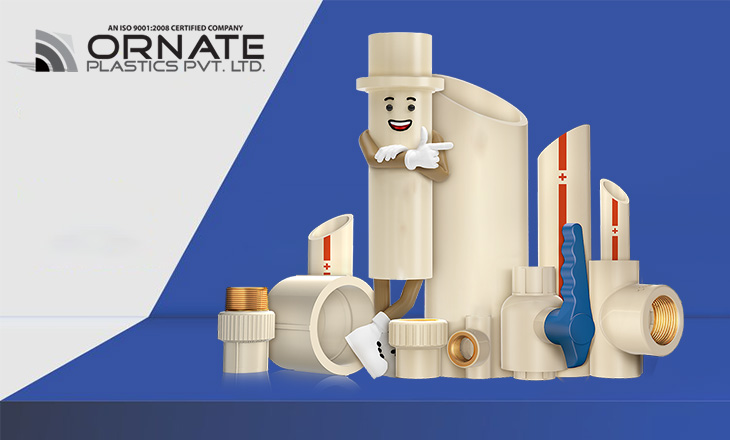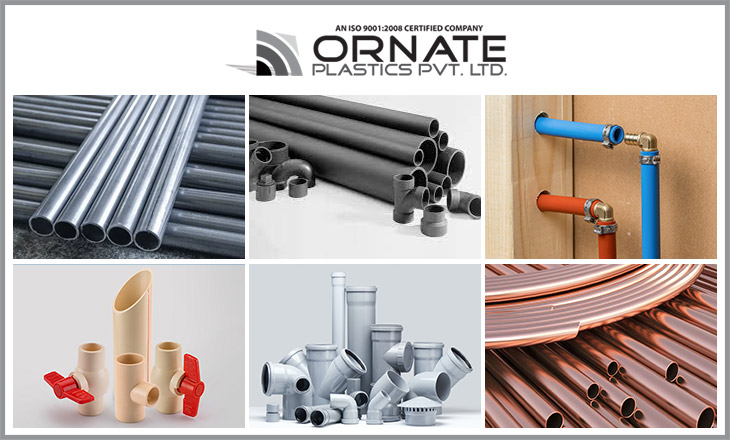


PVC pipe supplier, the world's third most popular synthetic polymer, is produced and used at a pace of 40 million metric tons per year. Its primary use is as a water conduit in a variety of settings. This product is in high demand worldwide because of what it is composed of. A polyvinyl chloride (PVC)-based channel is appropriate for a wide range of infrastructure applications, including water delivery, because of its many favorable physical and chemical qualities.
Polyvinyl chloride (PVC) is a chemical compound. A chlorinated hydrocarbon polymer is what it is. It is hard and brittle in its native condition. Adding chemicals like plasticizers makes it more durable and flexible, though. Other uses include insulation, medical tubing, and flooring. It may also be used as a rubber alternative. However, its most common use is in the production of pipes used in water supply, plumbing, and irrigation.
Several PVC pipes are used in industrial and commercial settings to transport hot or cold water, depending on the purpose. Over the last 80 years, PVC pipes have been employed for various commercial uses. Today, PVC pipes in the United States total two million miles. Find the best PVC pipe manufacturer.
For water delivery, PVC pipes are the norm. Nearly all of the main water pipelines are made of PVC. PVC pipes are also used in large-scale irrigation and sanitary sewage systems. Plumbing, drainage, agricultural irrigation, power, telecommunications networks, and heating and cooling ducting utilize PVC pipes. Utilities are using the bigger bore and thicker wall of underground PVC pipes to distribute drinking water across a network of residential and commercial structures.
Also, sewage systems use an underground PVC pipe tangle. The rainwater drains from the roofs, and other buildings are utilized. Landscape irrigation and fire sprinkler systems may also be constructed using these materials.
Pipes built of CPVC, a PVC variation, convey hot water in HVAC (Heating, Ventilation, and Air Conditioning) systems. PVC pipes are used to distribute cold water in heating and cooling systems.
Agricultural irrigation is another usage for PVC water supply pipes. Compared to open channel systems, it saves anywhere from 30 to 50 percent of the water. Using this product, soil salinization, swamping, and cold floods may also be prevented. To maximize land use, most of the PVC water pipe network has been installed underground.
Flexible, convenient, simple to alter, and automated, the PVC pipeline water supply system is ideal for various terrains and soils. Because of this, the irrigation efficiency and the ease of maintenance are both excellent.
Pipe fittings made of polyvinylchloride (PVC) plastic may be utilized in a wide variety of pipelines and building projects. In the case of older pipeline systems, they may be employed to upgrade them.
The integrity of pipeline joints is a significant source of pipeline networks' vulnerability. By using PVC pipes to strengthen the intersections, the whole network may be saved from being redesigned.
Corrosion in ancient iron pipes is causing water pipelines to deteriorate at an alarming rate, posing a severe danger to the supply of clean drinking water in many parts of the globe, including Australia. As a result, PVC pipes are impenetrable to external and internal corrosion. Corrosion is a problem that certain pipe manufacturers are still looking into finding "solutions" to, although PVC is indestructible.
The number one cause of burst water mains is corrosion in old technology pipes, which is an issue for most councils in Australia. Traffic diversion and road closure notifications are broadcast every day on the morning radio because of water main breaks and their effect on nearby communities.
Sinkholes formed by ruptured water mains even swallowed automobiles and property last year. UPVC pipe supplier has the lowest pipe break rate compared to cast iron, ductile iron, concrete, steel, and asbestos cement pipes.
Many chemicals and disinfectants have little effect on PVC pipes because of this. PVC pipes are an excellent choice for most water infrastructure projects because they can transport most strong acids, alkalis, and aqueous solutions (except those that are strongly oxidizing), aliphatic hydrocarbons, fluorides, photographic and plating solutions, brine, mineral oils, fats, and alcohols with little risk of the materials eating through the pipe. PVC pipes are also an excellent choice for transporting brine.
Pipe blockages are a big reason for worry in any pipeline system since they may cause a great deal of damage and need several hours of repair work.
When water moves slowly through a pipeline, it increases the risk of bottlenecks and breakdowns in a system with many interconnections. Compared to other pipe materials like copper, clay, or concrete, PVC has a much smoother inside lining, which minimizes water resistance and helps the water go to where it needs to go with the correct pressure. The high pressure of PVC pipe enables water to flow freely. As a result of the increased flow of PVC pipes, sewer and wastewater systems are less likely to accumulate.
For the same size concrete pipe, a recent field test conducted by the European Plastic Pipes and Fittings Association (TEPPFA) revealed PVC pipe installation to be 30 percent quicker than the concrete pipe. Time savings of 1 hour and 53 minutes on a sewage PVC pipe construction of two-chamber trenches 90 meters long, 2 meters deep, and 300mm in diameter are achieved.
Its smooth surface saves pumping expenses, and its leak-free connections decrease water loss, which may be as high as 40% in certain old-technology and corrosion-prone piping networks. Elastomeric seals enable PVC pipes to be linked without power or weather protection.
For more than half a century, PVC pipes have been demonstrated to be reliable in Australia, while international studies indicate that PVC pipes may last for more than 100 years. Testing on Australian PVC pressure pipes included in a recent 2014 international water pipe research shows that they can last for decades. PVC's lifespan and performance over 100 years may be supported by the combination of pipe inspection and testing dates, as well as earlier pipe break studies and dig-up reports of pipes in service.
Water utilities may minimize water main breaks and operation and maintenance expenses by integrating corrosion-proof PVC pipe in their replacement plans, according to the PVC Pipe Longevity Report findings. Iron pipeline corrosion is a big concern for water systems, and modern metallic pipes are suffering problems faster than older ones due to their thinner walls. There are many manufacturers available so find the best UPVC pipe manufacturer.
Before long, PVC pipe was the standard for water system lines everywhere. It was initially used as an alternative to conventional domestic plumbing materials in the 1960s and has been the industry standard.
PVC has only been widely utilized for a short period, making it difficult to determine its longevity. It is still up in the air how long PVC pipe can last, but many experts feel that it might be as long lasting as forged iron.
Copyright © 2021 ORNATE Plastics pvt.ltd. All rights reserved.






